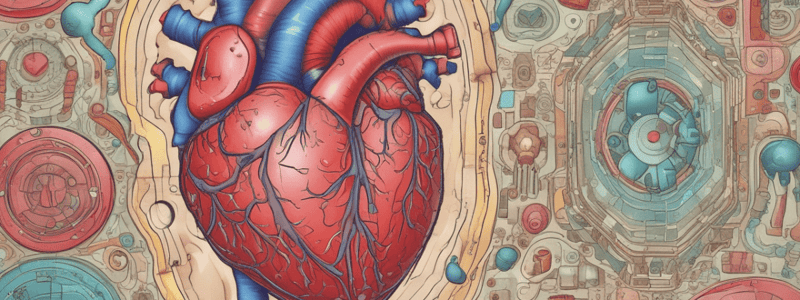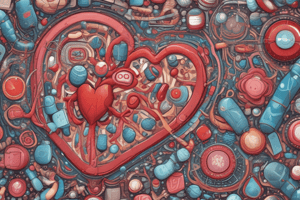Podcast
Questions and Answers
What is the effect of increasing blood pressure?
What is the effect of increasing blood pressure?
- Decreased cardiac output
- Increased blood pressure due to increased peripheral resistance (correct)
- Decreased blood pressure due to decreased heart rate
- Increased blood flow to the heart
What is the mechanism of action of furosemide?
What is the mechanism of action of furosemide?
- Increasing potassium reabsorption
- Inhibiting the RAAS system
- Decreasing aldosterone production
- Increasing sodium excretion in the loop of Henle (correct)
Why do diuretics that work further along the tubules of the kidney have less of an effect?
Why do diuretics that work further along the tubules of the kidney have less of an effect?
- Because the proximal tubules are unable to reabsorb sodium
- Because the distal tubules have a lower capacity for sodium reabsorption
- Because more sodium is reabsorbed in the distal tubules (correct)
- Because the kidneys are able to compensate for the loss of sodium
What is the main side effect of furosemide that can be decreased by administering it slowly via IV push?
What is the main side effect of furosemide that can be decreased by administering it slowly via IV push?
What electrolyte does spironolactone spare?
What electrolyte does spironolactone spare?
What is the mechanism of action of digoxin?
What is the mechanism of action of digoxin?
What is the therapeutic range of digoxin?
What is the therapeutic range of digoxin?
Why should potassium levels be monitored while on digoxin?
Why should potassium levels be monitored while on digoxin?
What should be checked before administering Digoxin?
What should be checked before administering Digoxin?
What is the suffix for Dihydropiridine Calcium Channel Blockers?
What is the suffix for Dihydropiridine Calcium Channel Blockers?
Why should you taper off Calcium Channel Blockers instead of stopping them suddenly?
Why should you taper off Calcium Channel Blockers instead of stopping them suddenly?
What is the prototype drug for beta blockers?
What is the prototype drug for beta blockers?
What is the mechanism of action of Nitroglycerin?
What is the mechanism of action of Nitroglycerin?
What is a common side effect of Clonidine?
What is a common side effect of Clonidine?
What is the primary use of Hydralazine?
What is the primary use of Hydralazine?
What is the suffix for HMG-CoA Reductase Inhibitors (Statins)?
What is the suffix for HMG-CoA Reductase Inhibitors (Statins)?
What is the effect of mannitol on the body?
What is the effect of mannitol on the body?
Why should Furosemide be administered earlier in the day?
Why should Furosemide be administered earlier in the day?
What is the effect of digoxin on the heart?
What is the effect of digoxin on the heart?
What should be monitored when a patient is taking Furosemide?
What should be monitored when a patient is taking Furosemide?
What is the mechanism of action of calcium channel blockers?
What is the mechanism of action of calcium channel blockers?
What is a common adverse effect of beta blockers?
What is a common adverse effect of beta blockers?
What is a contraindication for the use of grapefruit juice with calcium channel blockers?
What is a contraindication for the use of grapefruit juice with calcium channel blockers?
What is a common indication for the use of digoxin?
What is a common indication for the use of digoxin?
What is a common adverse effect of nitrates?
What is a common adverse effect of nitrates?
What is the suffix for beta blockers?
What is the suffix for beta blockers?
What is the effect of hyperkalemia on digoxin?
What is the effect of hyperkalemia on digoxin?
What is the therapeutic range for digoxin levels?
What is the therapeutic range for digoxin levels?
What is the effect of increasing blood flow to heart muscles during injury or ischemia?
What is the effect of increasing blood flow to heart muscles during injury or ischemia?
What is a side effect of phosphodiesterase inhibitors?
What is a side effect of phosphodiesterase inhibitors?
What should you do if you suspect someone is having a heart attack?
What should you do if you suspect someone is having a heart attack?
What is the route of administration for nitroglycerin?
What is the route of administration for nitroglycerin?
What is the mechanism of action of clonidine?
What is the mechanism of action of clonidine?
What is a side effect of hydralazine?
What is a side effect of hydralazine?
What is the purpose of statins?
What is the purpose of statins?
What should you do if you miss a dose of statin?
What should you do if you miss a dose of statin?
Flashcards are hidden until you start studying
Study Notes
Cardio 1: Blood Pressure and Diuretics
- Two ways to increase blood pressure: increasing blood volume and vasoconstriction
- RAAS (Renin-Angiotensin-Aldosterone System) drugs:
- ACE inhibitors: Lisinopril, Captopril
- Angiotensin-II receptor blockers: Valsartan, Losartan
- Angiotensin Receptor Neprilysin inhibitor: Sacubitril- Valsartan
- Diuretics:
- Four types: Loop diuretics, Thiazide diuretics, Potassium-sparing diuretics, Osmotic diuretics
- Furosemide: Administer early in the day to avoid nocturia; monitor potassium levels; can cause hypotension and ototoxicity
Furosemide
- Best taken early in the day to avoid nocturia
- Bumetanide is similar to Furosemide but works faster
- Not all diuretics cause hypotension as a side effect
- Furosemide must be administered slowly (20mg/min) via IV push to decrease the risk of ototoxicity
- Furosemide can lead to hypokalemia (especially in IV push)
Hydrochlorothiazide
- Educate patients on the use of sunblock due to increased photosensitivity
- Has a milder effect than Furosemide
Spirinolactone
- Spares potassium
- Blocks aldosterone in distal tubule, retains potassium, and excretes more sodium
- Often paired with other diuretics due to its mild effects
- Restrict potassium-rich foods to avoid hyperkalemia
- Can be used to treat acne and hirsutism in women due to its anti-androgen effects
Mannitol
- Similar structure to glucose
- Osmotic diuretic
- Serves as a sugary substance that water wants to dilute, pulling water out of tissues and into the blood
- Side effects: peripheral edema, dehydration
- Monitor intake and output, vitals, and electrolytes
- Not used to treat heart failure
Digoxin
- Cardiac glycoside
- Positive inotrope: increases the amount of calcium in heart muscles, leading to an increase in the force of heart muscle contraction, improving cardiac output
- Should be prescribed in heart failure palliative care settings
- Blocks Na/K pump
- Has a narrow therapeutic range
- Therapeutic range: 0.8-2ng/mL
- Signs of toxicity: confusion, fatigue, dizziness, blurry vision, N/V
- Hypokalemia can increase the risk of toxicity
- Antidote: Digoxin Immune Fab (Digibind or Digifab)
Calcium Channel Blockers
- Two groups: Dihydropyridines (Amlodipine, Clevidipine, Nicardipine) and Non-Dihydropyridines (Diltiazem, Verapamil)
- Suffix: -Dipine
- MOA: Blockade of calcium channels in blood vessels (Dihydropyridines) and heart muscles (Non-Dihydropyridines) causing a decrease in vascular resistance, blood pressure, and heart contraction
- Indications: SHARP (Subarachnoid Hemorrhage, Hypertension, Angina, Raynaud's phenomenon, Prinzmetal Angina)
- Side effects: Orthostatic hypotension, dizziness, constipation, flushing, headache, peripheral edema, gingival hyperplasia
- Avoid grapefruit juice, as it can cause severe hypotension
- Must be tapered off to avoid rebound hypertension
Beta Blockers
- Suffix: -olol
- Prototype drug: Metoprolol, Propranolol
- Check heart rate and systolic BP before administering
- Do not administer if heart rate is less than 60bpm and systolic BP is less than 100 mmHg
- Monitor diabetic patients closely, as beta blockers can mask tachycardia, a common symptom of hypoglycemia
- Indications: Hypertension, stable angina, chronic and compensated heart failure, dysrhythmias, anxiety, tachycardia
- Side effects: Bradycardia, heart blocks, breathing problems, lowered blood pressure, blood sugar masking
Nitrates
- Prototype drugs: Nitroglycerin, Isosorbide Mononitrate
- Suffix: -Nitro, -Nitrate
- MOA: Increase blood flow to heart muscles during injury or ischemia by vasodilating and relaxing the vessels, relieving the heart of added stress
- Indications: Acute chest pain, preventing chest pain, acute coronary syndrome
- Side effects: Flushing, headaches, hypotension
- Do not chew or drink grapefruit juice with nitrates
- Call 911 if acute chest pain persists
Alpha Blockers
- Prototype drug: Terazosin
- Alpha 1 blocker: Can cause severe orthostatic hypotension
Centrally Acting Alpha 2 Agonist Agents
- Prototype drug: Clonidine
- MOA: Decreases sympathetic response from brainstem to peripheral vessels, leading to vasodilation and lowered BP
- Indications: Hypertension
- Must be tapered over 2-4 days to avoid rebound hypertension
- Side effects: Drowsiness, decreased HR, dry mouth
- Educate patients to chew gum or hard candy to decrease dry mouth
Hydralazine
- Vasodilator of arterioles
- Decreases blood pressure
- Available in oral and IV forms
- Side effects: Reflex tachycardia, hypotension
HMG-CoA Reductase Inhibitors (Statins)
- Suffix: Statins
- MOA: Inhibit HMG-CoA reductase, a critical component of hepatic cholesterol synthesis
- Prototype drugs: Atorvastatin, Simvastatin, Rosuvastatin, Lovastatin, Pravastatin
- Side effects: Myopathy, rhabdomyolysis, diabetes, memory loss
- Pose a risk of teratogenicity during pregnancy
- Alternative medications: Bile sequestrant, Ezetimibe, Fibric acid derivatives
Studying That Suits You
Use AI to generate personalized quizzes and flashcards to suit your learning preferences.




